Key takeaways:
- Code reviews enhance code quality, promote knowledge sharing, and foster team dynamics, creating a collaborative and supportive environment.
- Common challenges include personal biases, focus on minor details over critical issues, and time constraints, which can hinder the effectiveness of reviews.
- Establishing a consistent code review process with clear roles, regular schedules, and feedback loops improves collaboration, accountability, and overall code quality.
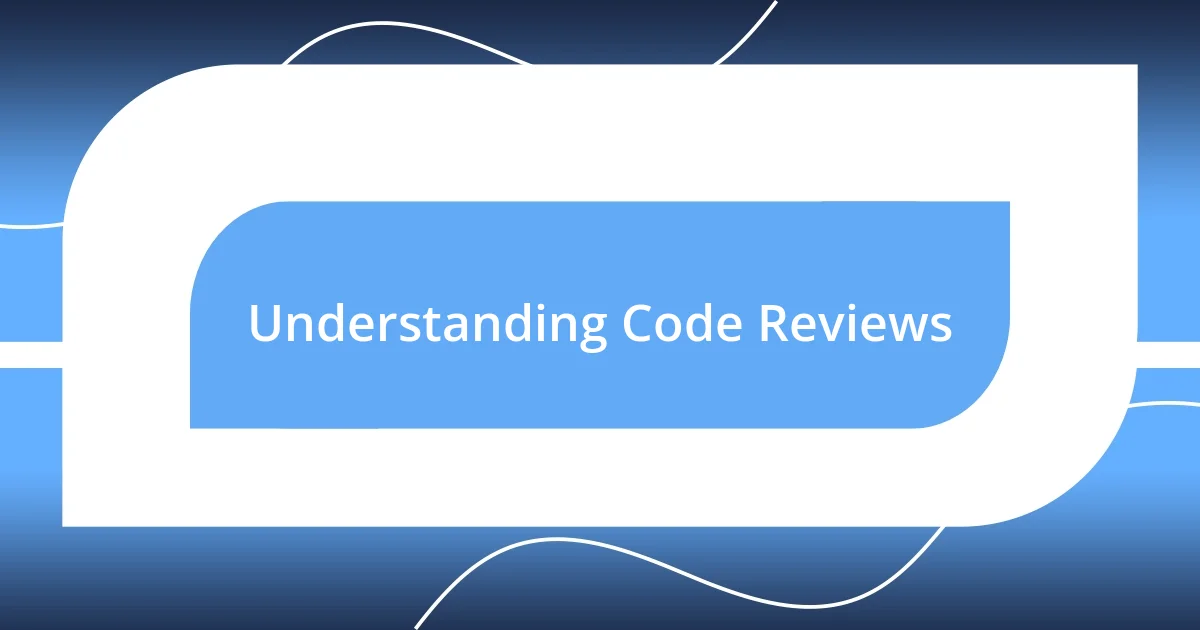
Understanding Code Reviews
Code reviews are like a vital conversation between developers, offering a chance to enhance both the code and the team’s collective knowledge. I remember early in my career feeling apprehensive about having my work scrutinized, thinking, “What if they find too many mistakes?” But over time, I realized that each suggestion was an opportunity for growth, turning potential anxiety into collaborative learning.
Have you ever had that moment where a colleague pointed out a simple tweak that made your code cleaner? That’s the magic of code reviews — they allow us to share perspectives and approaches that we might not have considered on our own. I still cherish the insight I gained when a peer suggested using a different algorithm; it not only improved my code’s efficiency but also deepened my appreciation for different coding styles.
Ultimately, understanding code reviews goes beyond fixing errors. They are a space for vulnerability and mentorship. Every review carries the potential to build stronger teams and better products. Think of it as a shared canvas where each developer adds their stroke, enriching the final masterpiece together.
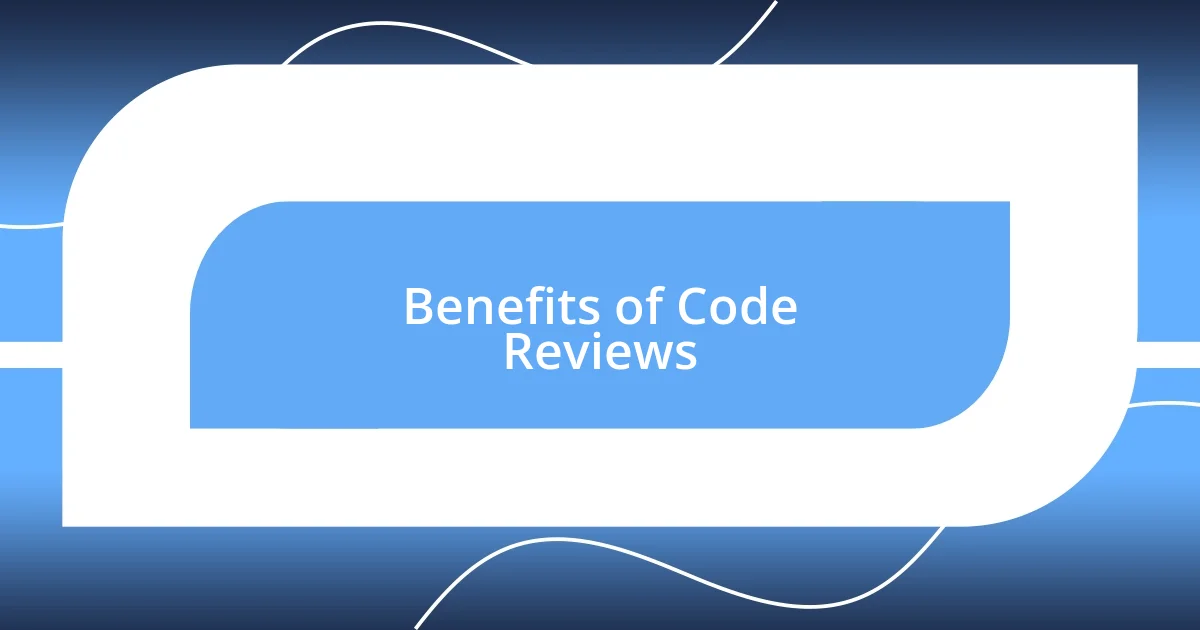
Benefits of Code Reviews
One of the greatest benefits of code reviews is the elevation of code quality. When I first started participating in them, I noticed how feedback often helped catch potential bugs early on, saving our team time and headaches later. This collaborative effort not only enhances the code base but fosters a culture of high standards and best practices within the team.
- Improved Code Quality: Collaborating on reviews leads to cleaner, more efficient code.
- Knowledge Sharing: Developers learn from one another, broadening their skill sets.
- Fostering Team Dynamics: Building trust and openness between team members promotes a positive work environment.
- Bug Prevention: Early identification and resolution of issues reduce future complications.
- Skill Development: Regular exposure to different styles and techniques helps everyone grow.
Reflecting on my journey, I’ve found that code reviews serve as a timely reminder that learning is a continuous process. Each suggestion I’ve received has allowed me to refine not just my code, but also my approach to problem-solving. It’s a safe space where I’ve felt supported, which has made embracing feedback feel less daunting and more rewarding.
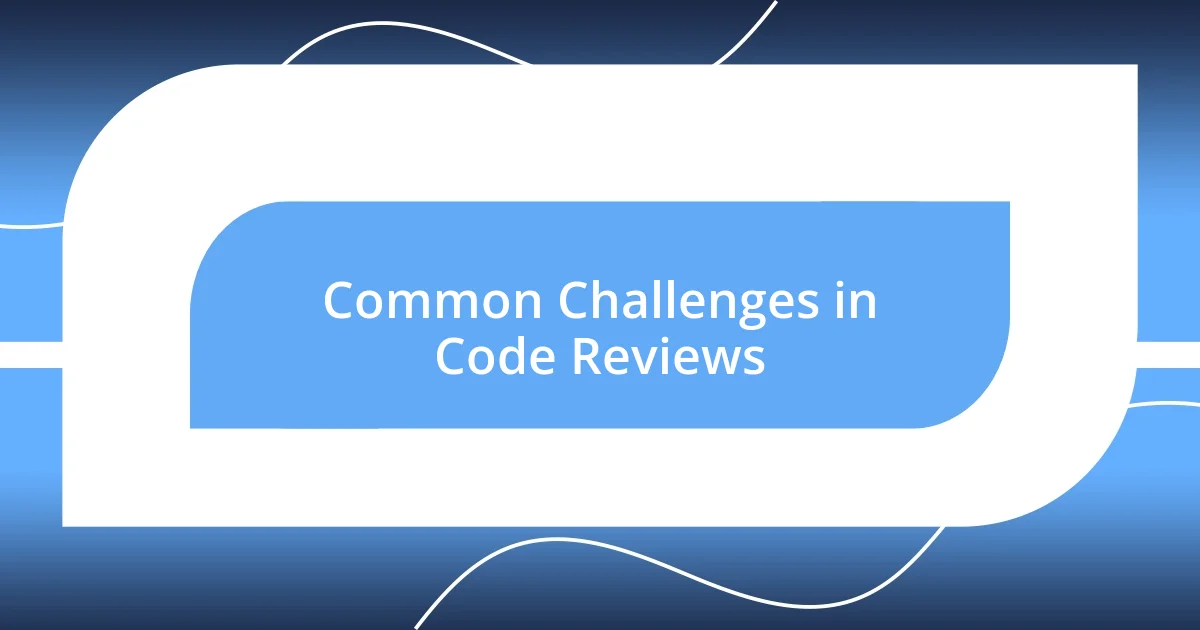
Common Challenges in Code Reviews
Engaging in code reviews can sometimes feel like navigating a minefield. I’ve often found that personal biases come into play, leading to disagreements over coding style or practices. For instance, there was a time when I preferred a functional approach, while a peer championed an object-oriented design. It wasn’t just about the code; emotions ran high as we defended our perspectives. This experience taught me the importance of being open-minded and respectful, recognizing that diverse approaches can coexist and enhance our final product.
Another challenge I’ve observed is the tendency to focus too much on minor details, like formatting or naming conventions, while overlooking critical logic errors. During one review, a colleague meticulously pointed out my inconsistent variable names but missed a significant flaw in my algorithm’s logic. I learned then that it’s vital to strike a balance; while the little things matter, the bigger picture should always be the primary focus. It’s a reminder to me to prioritize key functional aspects during reviews so that our efforts lead to substantial improvements.
A common hurdle we all encounter is the time needed for effective reviews. Sometimes, when deadlines loom, it’s tempting to skip thorough reviews to save time. I remember pushing through a rushed review myself, thinking I’d save the team time, only to realize later that my oversight led to bugs in production. This experience was a wake-up call, highlighting that investing adequate time in code reviews not only fosters quality but also builds trust among team members.
| Challenge | Description |
|---|---|
| Personal Biases | Disagreements due to differing coding styles can lead to tension. |
| Detail vs. Big Picture | Focusing on minor issues may result in overlooking critical logic errors. |
| Time Constraints | Rushed reviews can lead to mistakes in production. |
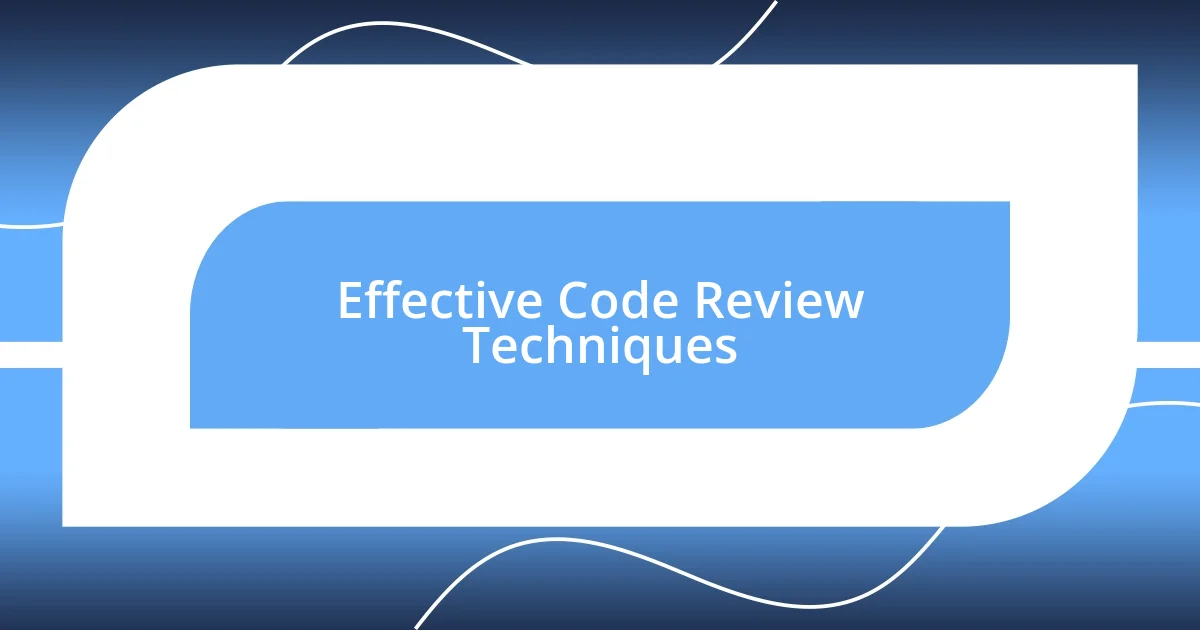
Effective Code Review Techniques
One effective technique I’ve found during code reviews is to begin with a positive note. It’s amazing how acknowledging what’s working well can create an open atmosphere, encouraging others to share their insights without fear of criticism. I vividly remember a time when I highlighted a colleague’s clever use of a library function; it sparked a productive discussion that led us down an exciting path of improvements. Have you ever considered how a simple compliment can reshape the dynamic of a team?
Another strategy that really enhances the review process is to establish a checklist of common issues to look out for. When I first started using a checklist, it was like having a roadmap for the review. For example, I made it a habit to check for potential performance hits, security vulnerabilities, and code consistency. On one occasion, the checklist saved us from a significant security flaw that could have impacted user data. Isn’t it fascinating how a structured approach can not only streamline the process but also safeguard the project?
Finally, I’ve learned the importance of timing in code reviews. Conducting reviews during coding sprints can often fuel frustration, adding pressure to developers who are already racing against deadlines. I remember this one sprint where we introduced a mid-cycle review, and it turned into a source of stress instead of support. In hindsight, allocating specific times, perhaps after a feature is complete, encourages a more relaxed atmosphere for brainstorming adjustments. How does your team handle timing during reviews? It’s something to reflect on to ensure efficiency and morale stay high.
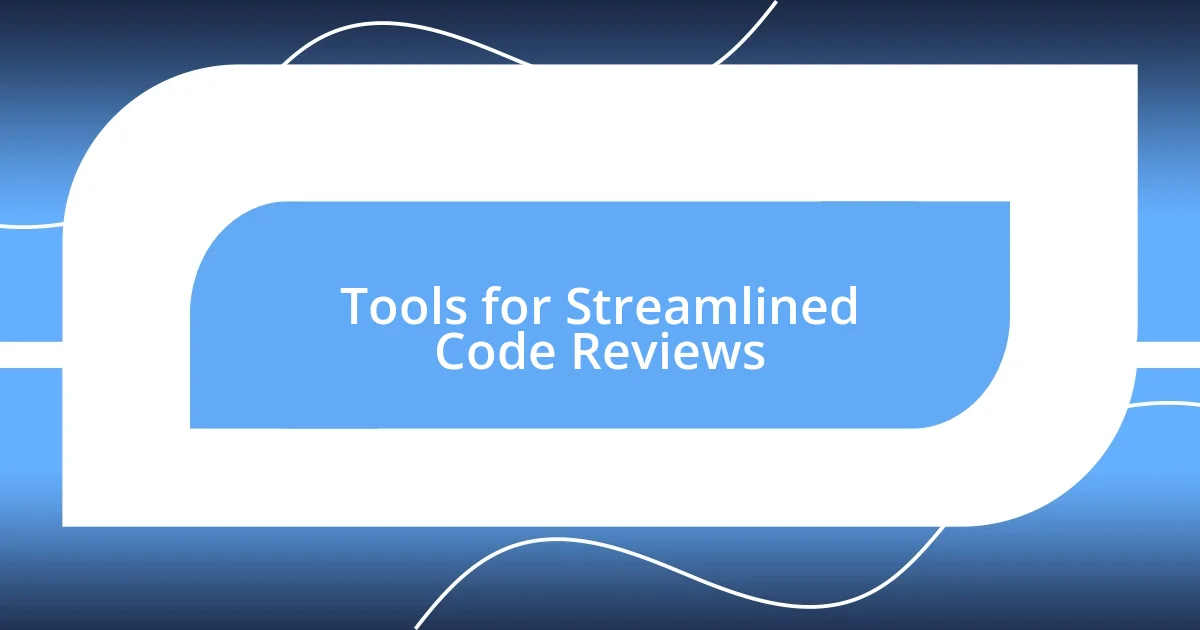
Tools for Streamlined Code Reviews
When it comes to tools for streamlined code reviews, I’ve come to appreciate code collaboration platforms like GitHub and Bitbucket. These tools not only allow for easy access to code but also facilitate inline comments, making discussions clearer and more precise. I remember when I first used GitHub for a project; the ability to comment directly on specific lines of code transformed our feedback loop. Have you ever noticed how much smoother conversations get when they’re tied directly to the work at hand?
Another tool that has made a significant impact in my experience is code review automation software, like Review Board and Crucible. These platforms can automatically highlight potential issues, around security concerns and adherence to coding standards, which often saves a considerable amount of time. On one occasion, a tool identified an entire segment of unoptimized code that we hadn’t considered—it’s like having a second pair of eyes that never sleeps! Does your team leverage automation in reviews? It can make a world of difference in spotting what might otherwise slip through the cracks.
Additionally, integrating tools that support continuous integration (CI) with code review processes has been a game-changer for my workflow. When I implemented CI with Jenkins in one of my projects, it ensured that every code push was tested automatically. I found that this not only expedited the review process but also caught bugs before they reached the main branch. Isn’t it reassuring to know that technologies can help us maintain a high standard of quality while keeping the pace of development?
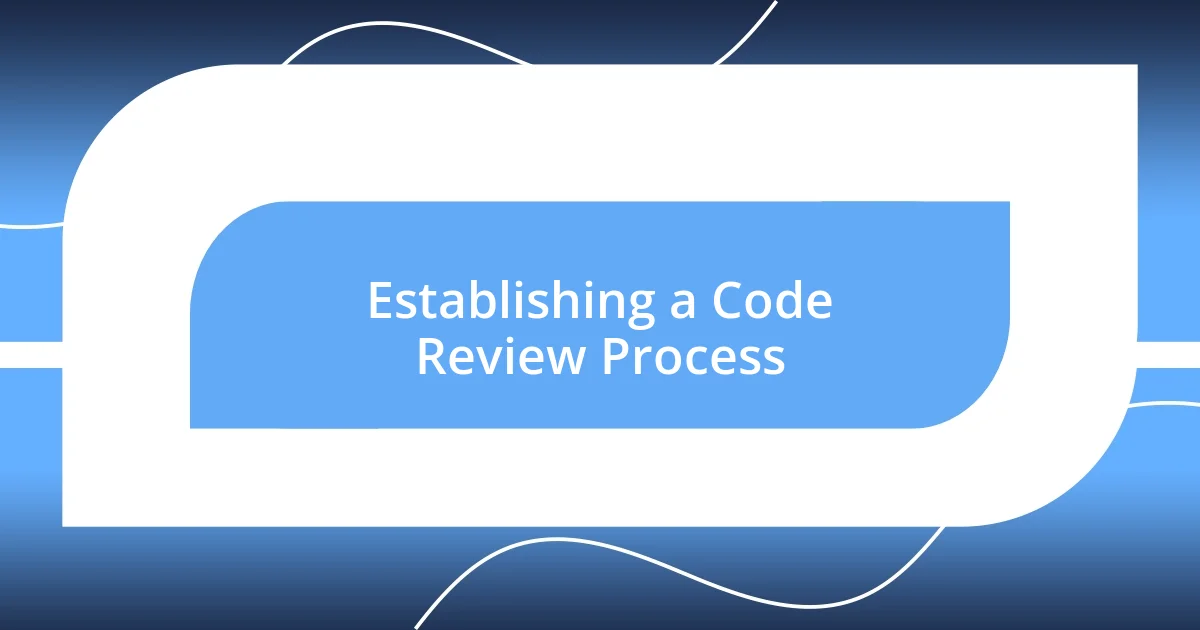
Establishing a Code Review Process
Establishing a consistent code review process starts with defining clear roles and expectations for everyone involved. I once joined a team where we had different interpretations of what a review should entail. By laying out guidelines on how to give and receive feedback, we not only avoided misunderstandings but also fostered a shared sense of responsibility among team members. Don’t you think having clarity can truly enhance collaboration and trust within a team?
Moreover, I’ve discovered that setting a regular cadence for code reviews can significantly improve their effectiveness. In one of my past projects, we created a weekly review schedule that allowed us to prepare ahead of time. This structure gave us the opportunity to dive deep into the code rather than rushing through. It was enlightening to see how much more thorough and thoughtful our discussions became when we weren’t pressed for time. Have you ever experienced the benefits of routine in any professional setting?
Finally, integrating feedback loops is crucial for a strong code review process. I remember the first time we implemented a system to track recurring issues discussed in reviews. This led to a noticeable drop in similar mistakes over time. It made me realize how reflecting on past feedback can drive growth and improvement. Isn’t it rewarding when a team learns from its history to create better outcomes in the future? Embedding this practice has truly enriched our overall development efforts.














